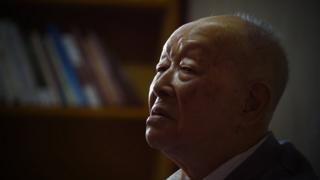 Chinese linguist Zhou Youguang, who created the writing system that turns Chinese characters into words using letters from the Roman alphabet, has died aged 111.
Chinese linguist Zhou Youguang, who created the writing system that turns Chinese characters into words using letters from the Roman alphabet, has died aged 111.
Mr Zhou and a Communist party committee spent three years developing the Pinyin system in the 1950s.
It changed the way the language was taught and helped raise literacy rates.
Mr Zhou, who was born in 1906 during the Qing Dynasty, later became a fierce critic of China’s communist rulers.
He died in Beijing on Saturday a day after his birthday, Chinese media reported.
As a young man Mr Zhou spent time in the US and worked as a Wall Street banker.
He returned to China after the communist victory in 1949 and was put in charge of creating a new writing system using the Roman alphabet.
“We spent three years developing Pinyin. People made fun of us, joking that it had taken us a long time to deal with just 26 letters,” he told the BBC in 2012.
Before Pinyin was developed, 85% of Chinese people could not read, now almost all can.
Pinyin has since become the most commonly used system globally, although some Chinese communities – particularly in Hong Kong and Taiwan – continue to use alternatives.
It is also widely used to type Chinese characters on computers and smartphones, leading some to fear it could end up replacing Chinese characters altogether.
The achievement protected Mr Zhou from some of the persecution that took place under former leader Mao Zedong.
However, he was later sent to the countryside for re-education during Mao’s Cultural Revolution.
In his later years he became strongly critical of the Chinese authorities and wrote a number of books, most of which were banned.
In a 2011 interview with NPR he said he hoped he would live long enough to see the Chinese authorities admit that the bloody crackdown on pro-democracy protesters in Tiananmen Square in 1989 had been a mistake.
He said ordinary people no longer believed in the Communist Party, and that the vast majority of Chinese intellectuals were in favour of democracy.






